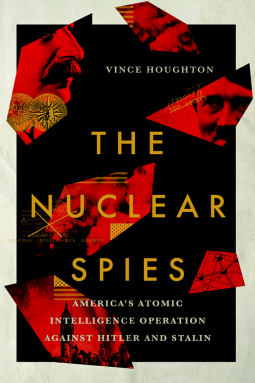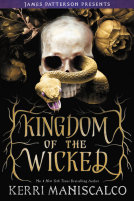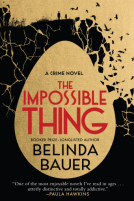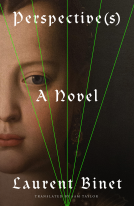
The Nuclear Spies
America's Atomic Intelligence Operation against Hitler and Stalin
by Vince Houghton
This title was previously available on NetGalley and is now archived.
Send NetGalley books directly to your Kindle or Kindle app
1
To read on a Kindle or Kindle app, please add kindle@netgalley.com as an approved email address to receive files in your Amazon account. Click here for step-by-step instructions.
2
Also find your Kindle email address within your Amazon account, and enter it here.
Pub Date Sep 15 2019 | Archive Date Oct 29 2019
Talking about this book? Use #TheNuclearSpies #NetGalley. More hashtag tips!
Description
Why did the US intelligence services fail so spectacularly to know about the Soviet Union's nuclear capabilities following World War II? As Vince Houghton, historian and curator of the International Spy Museum in Washington, DC, shows us, that disastrous failure came just a few years after the Manhattan Project's intelligence team had penetrated the Third Reich and knew every detail of the Nazi 's plan for an atomic bomb. What changed and what went wrong?
Houghton's delightful retelling of this fascinating case of American spy ineffectiveness in the then new field of scientific intelligence provides us with a new look at the early years of the Cold War. During that time, scientific intelligence quickly grew to become a significant portion of the CIA budget as it struggled to contend with the incredible advance in weapons and other scientific discoveries immediately after World War II. As Houghton shows, the abilities of the Soviet Union's scientists, its research facilities and laboratories, and its educational system became a key consideration for the CIA in assessing the threat level of its most potent foe. Sadly, for the CIA scientific intelligence was extremely difficult to do well. For when the Soviet Union detonated its first atomic bomb in 1949, no one in the American intelligence services saw it coming.
Advance Praise
"The Nuclear Spies makes a significant contribution to intelligence studies by filling a gap in the literature: the importance of individual and institutional threat perceptions and cultural preconceptions when it comes to the development of strategic policy." - Genevieve Lester, US Army War College, author of When Should State Secrets Stay Secret?
"Vince Houghton is exceptionally well-versed in the history of the intelligence challenges. The Nuclear Spies is an illuminating and valuable book describing the terrifying dawn, at the turn from World War II to the Cold War, of scientific intelligence." - Richard Immerman, Temple University, author of The Hidden Hand
"The Nuclear Spies is a valuable contribution to the history of science and, in particular, the emergence of scientific intelligence as a national security tool. It delineates the successes and failures of American intelligence organizations during and after WWII, and is critical for our current and future scientific intelligence programs." - John C. Browne, Los Alamos National Laboratory
"The Nuclear Spies deftly navigates the decisions made, for better or worse, by World War II–era American intelligence agencies. This book [adds to our] understanding of scientific intelligence as a tool for national security." - Valerie Plame, former covert CIA Operations Office
Available Editions
| EDITION | Hardcover |
| ISBN | 9781501739590 |
| PRICE | $27.95 (USD) |
| PAGES | 248 |
Links
Featured Reviews
 Michael E, Reviewer
Michael E, Reviewer
Great read! Absolutely exhaustively researched, it reads like an espionage thriller, but in which the sleuths make their deductions based not on evidence and cold hard facts, but on assumptions that were borne of cultural differences between the West and the Soviet Union, and assumptions that were borne of an unearned regard for German R&D efforts in the face of that country's massive military spending. We have a perfect case of giving too much credit to the Germans, and nowhere near enough credit to the Soviets. Truman himself believed "those Asiatics" (his word for the Soviets) would never be able to produce a nuclear weapon. It's this same mindset that allowed the West to be taken by surprise when the Soviets became the first to launch a manmade satellite, the first to put a man in space, and the first to photograph the so-called "dark side" of the moon. An excellent article I recently read suggests that this locked-down mindset continues today through CIA intelligence estimates of the Soviet, and now Russian, nuclear missile threat. We continue to underestimate what power lies beyond the horizon in the hands of those who would wish to see us most harmed.
Very good book. Four stars.
 Educator 505105
Educator 505105
Interesting background on the race for the nuclear bomb; less detail on the nuclear spies themselves than I would like, but fascinating subject.
 Cristie U, Book Trade Professional
Cristie U, Book Trade Professional
The author's painstaking research and attention to detail is obvious in the writing of this book. There were many facts that I only discovered after reading this!
Historian and curator of what sounds like a fascinating institution, the International Spy Museum, Vince Houghton dives into two topics that have been tackled many times before but perhaps never as comprehensively. He asks, essentially: how did the Allies do so well in understanding the Nazis' atomic bomb efforts in World War II, yet blunder so badly in predicting when the Soviets might test their first nuclear weapon (in case you don't know, the second took place in 1949 and it left the Americans dumbstruck). Both topics are close to my heart, so I devoured "The Nuclear Spies: America's Atomic Intelligence Operation against Hitler and Stalin" with the speed of a Dan Brown romp. Houghton's organization skills and penmanship are exemplary, and the scholarship on display is first rate. "The Nuclear Spies" is modern history as it should be written.







